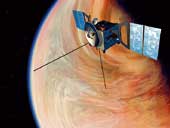 |
| An artist’s impression of the Venus Express. (AFP) |
Darmstadt, Germany, Nov. 9 (Reuters): Europe’s first space probe to Venus blasted off today on a mission to shed light on Earth’s closest planetary neighbour and give scientists clues about global warming.
From its Space Operations Centre in Darmstadt, the European Space Agency said the 1.3-tonne Venus Express probe had taken off from Baikonur, Kazakhstan, on board a Soyuz rocket early this morning ? after a two-week delay.
Scientists and technicians applauded and congratulated each other with champagne in Darmstadt after the first radio signals from the probe were received two hours later.
The Venus Express will travel through space for around 163 days. Once captured by Venus’s gravity in April it will orbit the planet and analyse its extreme greenhouse atmosphere and dense cloud cover for about 500 days.
“Naturally we’re hoping for some surprises and to be in a position to answer some of the open questions about Venus and its atmosphere,” said project head Ralf Jaumann.
Among the riddles the mission hopes to solve is why a planet so similar to Earth in size, mass and composition has evolved so differently over the last 4,600 million years. Temperatures on Venus average 450 degrees Celsius.
There are theories that intense volcanic activity could have created an extreme greenhouse atmosphere that is responsible for the current conditions on Venus, whose atmosphere is almost entirely comprised of carbon dioxide.
Some scientists say there may once have been life on Venus. They hope to obtain clues about greenhouse conditions on Venus and whether any comparisons with global warming can be drawn. “We’re hoping to discover why it got so hot on Venus and not Earth, its twin planet,” said Mick Locher, a German space expert.
Atmospheric pressure is 90 times greater than on Earth and no space probe that has gone into the planet’s atmosphere has survived for long, with a Russian device setting the record of 110 minutes before melting in the heat.
A layer of clouds about 20-km thick covers the planet to an altitude of over 60 km.
The Venus probe will orbit the planet's poles well above the cloud cover from a distance of 250 to 66,000 km. Venus's days are the equivalent of 243 Earth days, due to its slower rotation.
The planned launch on Oct. 26 was delayed after technicians discovered contamination on the covering of the probe's Russian-made Soyuz-Fregat launcher, but this proved harmless.
The Venus Express is essentially a slight variation on the ESA's“Mars Express” probe, which has been providing spectacular images of the red planet since the end of 2003.
A total of 25 companies from 14 European countries are involved in the Venus Express, which cost 220 million euros.










